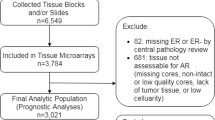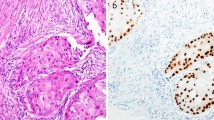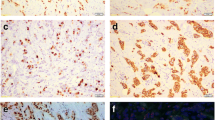Abstract
The purpose of this article is to evaluate the prognostic value of androgen receptor (AR) expression in patients with estrogen receptor (ER)-positive breast cancer, treated with endocrine therapy, with or without the addition of chemotherapy. A consecutive series of 953 patients with ER-positive breast cancer, treated between 1998 and 2003, was selected. Repeated immunohistochemistry confirmed the expression of ER in the tumor of 938 patients. AR expression was measured by immunohistochemistry. The Kaplan–Meier method, logrank test and multivariate Cox models were used to explore the impact of AR expression on time to relapse (TTR) and disease specific survival (DSS) in all patients and in subgroups treated with chemo-endocrine therapy or endocrine therapy alone. AR immunoreactivity was assessable in 859 tumors and positive in 609 (70.9%). AR expression was a significant marker of good prognosis for TTR (P = 0.001) and DSS (P < 0.001). This effect was particularly evident in the group of patients receiving chemo-endocrine therapy (TTR (P = 0.015) and DSS (P < 0.001)). Cox models confirmed AR as an independent variable for both TTR (P = 0.003, HR 0.444, 95%CI 0.258–0.765) and DSS (P < 0.001, HR 0.135, 95%CI 0.054–0.337). Thus, we focused on ER-positive luminal B breast cancer that may be selected for chemotherapy because of their more aggressive immunophenotype. In this subset AR expression identified a group of patients with better prognosis for TTR (P = 0.017, HR 0.521, 95%CI 0.306–0.888) and DSS (P = 0.001, HR 0.276, 95% CI 0.130–0.588). AR expression is an independent prognostic factor of better outcome in patients with ER-positive breast cancers.




Similar content being viewed by others
References
Rakha EA, El-Sayed ME, Green AR et al (2007) Prognostic markers in triple-negative breast cancer. Cancer 109:25–32
Schippinger W, Regitnig P, Dandachi N et al (2006) Evaluation of the prognostic significance of androgen receptor expression in metastatic breast cancer. Virchows Arch 449:24–30
Peters AA, Buchanan G, Ricciardelli C et al (2009) Androgen receptor inhibits estrogen receptor-alfa activity and is prognostic in breast cancer. Cancer Res 69:6131–6140
Moinfar F, Okcu M, Tsybrovskyy O et al (2003) Androgen receptors frequently are expressed in breast carcinomas: potential relevance to new therapeutic strategies. Cancer 98:703–711
Kuenen-Boumeester V, Van der Kwast TH, Claassen CC et al (1996) The clinical significance of androgen receptors in breast cancer and their relation to histological and cell biological parameters. Eur J Cancer 32A:1560–1565
Sapino A, Righi L, Cassoni P et al (2001) Expression of apocrine differentiation markers in neuroendocrine breast carcinomas of aged women. Mod Pathol 14:768–776
Kollara A, Kahn HJ, Marks A et al (2001) Loss of androgen receptor associated protein 70 (ARA70) expression in a subset of HER2-positive breast cancers. Breast Cancer Res Treat 67:245–253
Ogawa Y, Hai E, Matsumoto K et al (2008) Androgen receptor expression in breast cancer: relationship with clinicopathological factors and biomarkers. Int J Clin Oncol 13:431–435
Gatalica Z (1997) Immunohistochemical analysis of apocrine breast lesions. Consistent over-expression of androgen receptor accompanied by the loss of estrogen and progesterone receptors in apocrine metaplasia and apocrine carcinoma in situ. Pathol Res Pract 193:753–758
Niemeier LA, Dabbs DJ, Beriwal S et al (2009) Androgen receptor in breast cancer: expression in estrogen receptor-positive tumors and in estrogen receptor-negative tumors with apocrine differentiation. Mod Pathol. doi:10.1038/modpathol.2009.159
Bryan RM, Mercer RJ, Bennett RC et al (1984) Androgen receptors in breast cancer. Cancer 54:2436–2440
Agrawal AK, Jeleń M, Grzebieniak Z et al (2008) Androgen receptors as a prognostic and predictive factor in breast cancer. Folia Histochem Cytobiol 46:269–276
Gonzalez-Angulo AM, Stemke-Hale K, Palla SL et al (2009) Androgen receptor levels and association with PIK3CA mutations and prognosis in breast cancer. Clin Cancer Res 15:2472–2478
Sorlie T, Perou CM, Tibshirani R et al (2001) Gene expression patterns of breast carcinomas distinguish tumor subclasses with clinical implications. Proc Natl Acad Sci USA 98:10869–10874
Perou CM, Sorlie T, Eisen MB et al (2000) Molecular portraits of human breast tumours. Nature 406:747–752
Sorlie T, Tibshirani R, Parker J et al (2003) Repeated observation of breast tumor subtypes in independent gene expression data sets. Proc Natl Acad Sci USA 100:8418–8423
Cheang MC, Chia SK, Voduc D et al (2009) Ki67 index, HER2 status, and prognosis of patients with luminal B breast cancer. J Natl Cancer Inst 101:736–750
Sapino A, Marchiò C, Senetta R et al (2006) Routine assessment of prognostic factors in breast cancer using a multicore tissue microarray procedure. Virchows Arch 449:288–296
Marchiò C, Lambros MB, Gugliotta P et al (2009) Does chromosome 17 centromere copy number predict polysomy in breast cancer? A fluorescence in situ hybridization and microarray-based CGH analysis. J Pathol 219:16–24
Liu S, Chia SK, Mehl E et al (2010) Progesterone receptor is a significant factor associated with clinical outcomes and effect of adjuvant tamoxifen therapy in breast cancer patients. Breast Cancer Res Treat 119:53–61
Wolff AC, Hammond ME, Schwartz JN et al (2007) American Society of Clinical Oncology/College of American Pathologists guideline recommendations for human epidermal growth factor receptor 2 testing in breast cancer. J Clin Oncol 25:118–145
McShane LM, Altman DG, Sauerbrei W et al (2006) REporting recommendations for tumor MARKer prognostic studies (REMARK). Breast Cancer Res treat 100:229–235
Park S, Koo J, Park HS et al (2009) Expression of androgen receptors in primary breast cancer. Ann Oncol. doi:10.1093/annonc/mdp510
Koo JS, Jung W, Jeong J (2009) The predictive role of E-cadherin and androgen receptor on in vitro chemosensitivity in triple-negative breast cancer. Jpn J Clin Oncol 39:560–568
De Amicis F, Thrugnansampanthan J, Cui Y et al (2009) Androgen receptor overexpression induces tamoxifen resistance in human breast cancer cells. Breast Cancer Res Treat. doi:10.1007/s10549-009-0436-8
Goldhirsch A, Ingle JN, Gelber RD et al (2009) Thresholds for therapies: highlights of the St Gallen International Expert Consensus on the Primary Therapy of Early Breast Cancer 2009. Ann Oncol 20:1319–1329
Hess-Wilson JK, Daly HK, Zagorski WA et al (2006) Mitogenic action of the androgen receptor sensitizes prostate cancer cells to taxane-based cytotoxic insult. Cancer Res 66:11998–12008
Acknowledgments
This study was funded by Compagnia San Paolo di Torino, Cassa di Risparmio di Torino, AIRC 2007–2009, Ricerca Finalizzata Regione Piemonte 2008, MIUR-PRIN 2008.
Author information
Authors and Affiliations
Corresponding author
Additional information
An invited commentary to this article can be found at doi:10.1007/s10549-010-0864-5.
Electronic supplementary material
Below is the link to the electronic supplementary material.
Rights and permissions
About this article
Cite this article
Castellano, I., Allia, E., Accortanzo, V. et al. Androgen receptor expression is a significant prognostic factor in estrogen receptor positive breast cancers. Breast Cancer Res Treat 124, 607–617 (2010). https://doi.org/10.1007/s10549-010-0761-y
Received:
Accepted:
Published:
Issue Date:
DOI: https://doi.org/10.1007/s10549-010-0761-y




